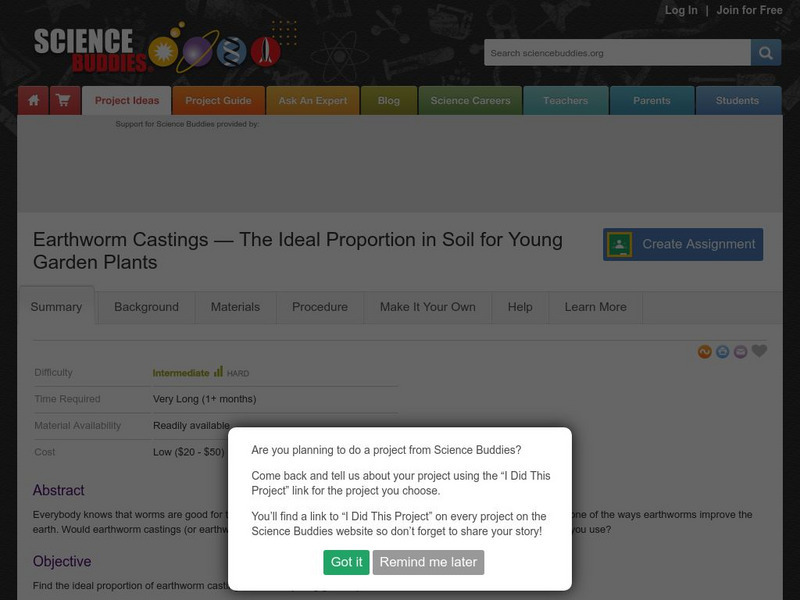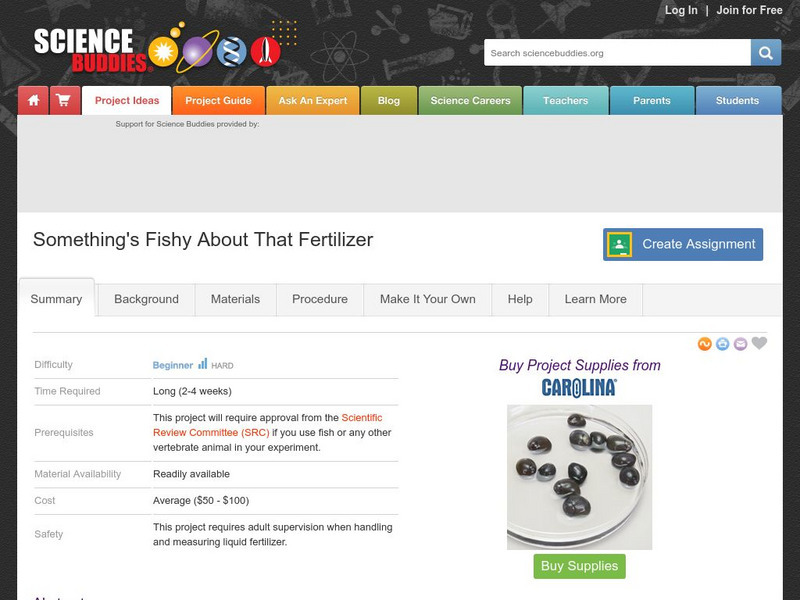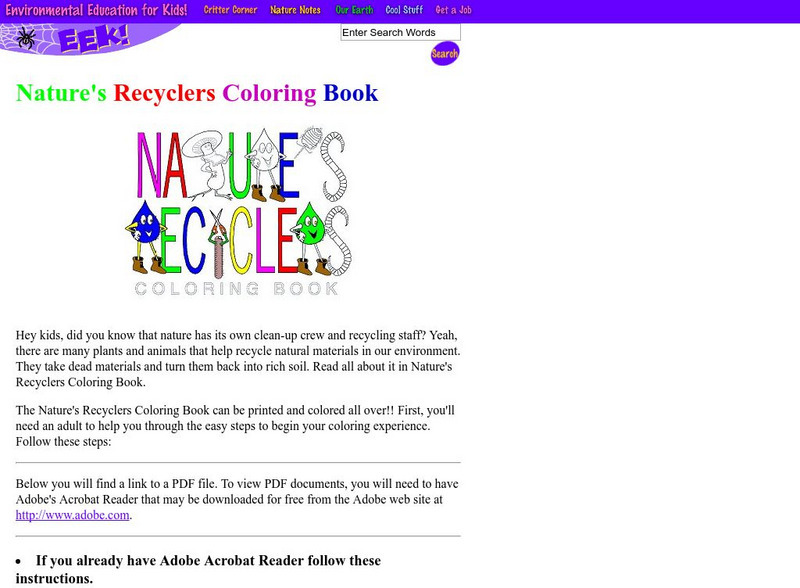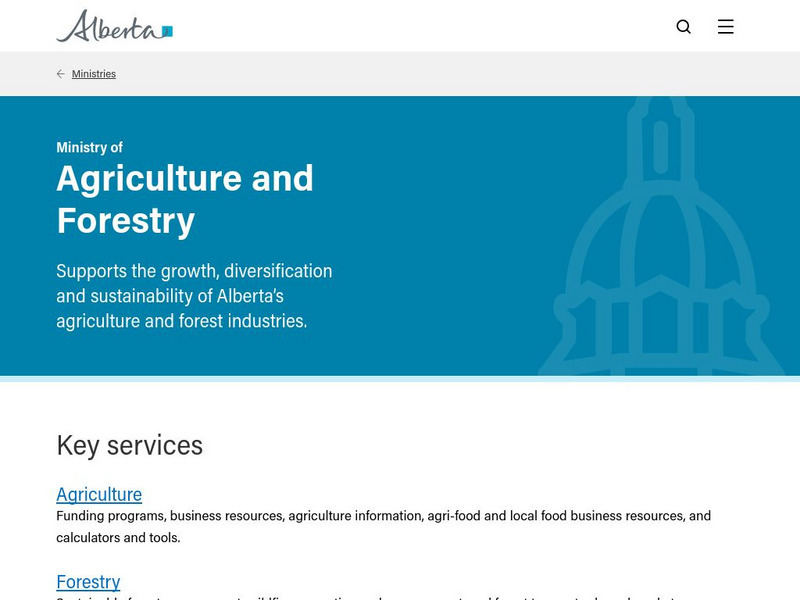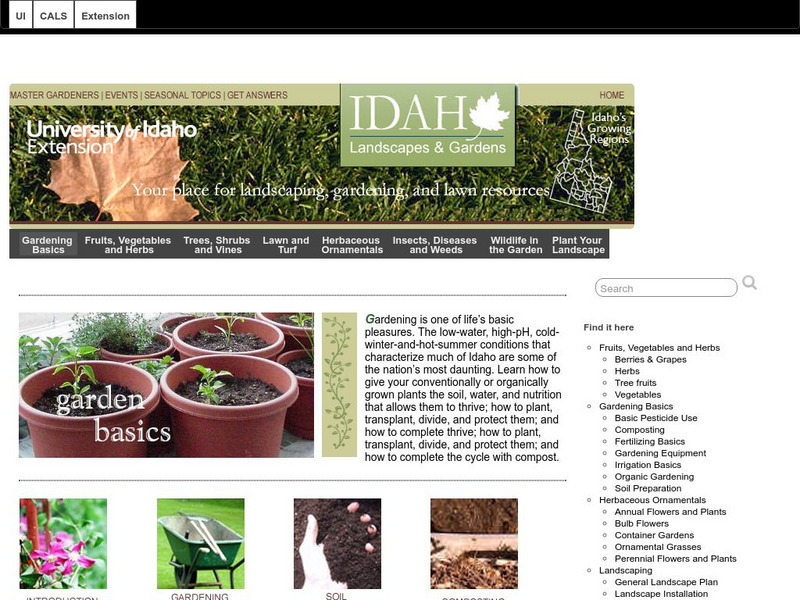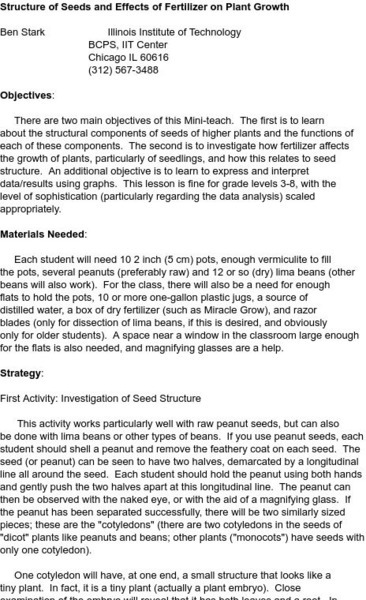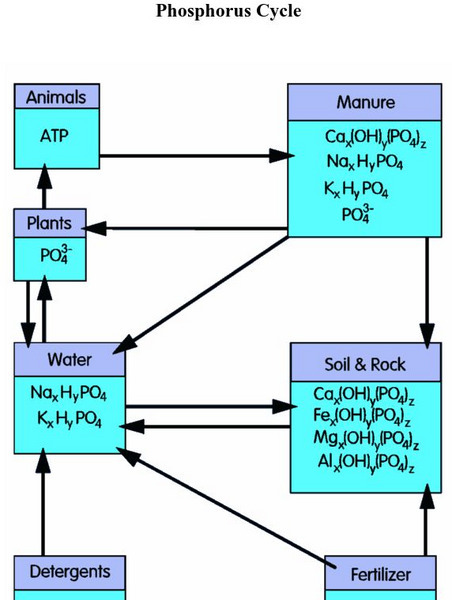Michigan State University
Michigan State University: Digital Learning Center for Microbial Ecology: Microbe Zoo: Poo Corner
A light-hearted and informative section about the role of microorganisms in decomposing human waste. It has a colorful, clickable graphic aiding in navigation of the site. Fun and informative.
National Institutes of Health
National Institutes of Health: Household Products Database
A database of common, household products which includes product ingredients, potential health effects, and safety and handling of these chemicals.
Science Buddies
Science Buddies: Too Much of a Good Thing? Effects of Fertilizer on Algal Growth
Algae is a good thing, but too much is a bad thing. In this environmental science fair project, grow algae in several concentrations of fertilizer and observe its effect on algal growth.
Science Buddies
Science Buddies: Earthworm Castings: Soil for Young Garden Plants
Everybody knows that worms are good for the soil, but not everybody knows why. Here's a project that investigates just one of the ways earthworms improve the earth.
Science Buddies
Science Buddies: Nitrogen Fixing Bacteria and Nitrogen Fertilizers
Plants need nitrogen to build proteins and nucleic acids to grow healthy stems and leaves. Though the Earth's atmosphere is made up of 79% nitrogen, the form of nitrogen found in the atmosphere cannot be used by plants. In this...
Science Buddies
Science Buddies: Something's Fishy About That Fertilizer
Did you know that when you use fertilizer in your garden, it can eventually reach a lake, stream, or pond? There are many different chemicals present in fertilizers. Learn how they affect the aquatic organisms in the ecosystem within...
Other
The Plant Cell: Teaching Tools in Plant Biology: Why Study Plants?
Plants are essential for all life and development. Teach your students about this incredible lifeforce with this teaching guide, lecture notes, and PowerPoint presentation. [PDF]
Utah Education Network
Uen: Making a Mini Worm Habitat
Activity shows the process of converting organic waste into usable fertilizer.
Environmental Education for Kids
Eek!: Nature's Recyclers Coloring Book
Did you know that nature has its own clean-up crew and recycling staff? Yeah, there aremany plants and animals that help recycle natural materials in our environment. They take deadmaterials and turn them back into rich soil. Use this...
Science Buddies
Science Buddies: Growing, Growing, Gone! An Experiment on Nitrogen Fertilizers
Plants need nitrogen to build proteins and nucleic acids to grow healthy stems and leaves. Though the Earth's atmosphere is made up of 79% nitrogen, the form of nitrogen found in the atmosphere cannot be used by plants. In this...
Open Door Team
Open Door Web Site: Jethro Tull and the Seed Drill
Jethro Tull (1674-1741) invented a machine that helped to increase the harvest yield by planting seeds in straight lines, a vast improvement over sowing by hand that led to greater crop yields.
Other
Alberta Government: Choosing a Fertilizer
Site gives a fairly high level breakdown of the general contents of a fertilizer (the Nitrogen, Phosphorus, Potassium, and Sulfur content) and what that does for soil.
Texas A&M University
Aggie Horticulture Network: Composting for Kids
Use this resource to learn about how we make compost and how we use it to grow gardens.
Annenberg Foundation
Annenberg Learner: The Control a Haber Bosch Ammonia Plant
An activity where students try to optimize profits by producing the largest daily output of ammonia by simulating the Haber-Bosch process. Students will use their knowledge of equilibrium reactions and the effects of variables like...
Read Works
Read Works: Dead Zone
[Free Registration/Login Required] Students read about the "dead zone," an area in the Guld of Mexico where no fish can live due to pollution from fertilizer. A question sheet is available to help students build skills in cause and effect.
CK-12 Foundation
Ck 12: Chemistry: Agriculture
[Free Registration/Login may be required to access all resource tools.] Describes the role of chemistry in agriculture, in both beneficial and harmful ways.
CK-12 Foundation
Ck 12: Chemistry: Agriculture
[Free Registration/Login may be required to access all resource tools.] Describes the role of chemistry in agriculture, in both beneficial and harmful ways.
Science Education Resource Center at Carleton College
Serc: Duckweed Bioassay
This lab was designed with the intent to mimic the effect fertilizers can have on plants in a lake or pond ecosystem. Students determine the effect different fertilizer concentrations have on the growth rate of duckweed plants, as...
BBC
Bbc: Gcse Bitesize: Making Fertilizer
This lesson focuses on fertilizers including how they replace nitrogen, phosphorus and potassium in the ground; how the plants get the nutrients; a table showing examples of fertilisers, their formula, and the essential elements they...
Other
University of Idaho Extension: Idaho Landscapes & Gardens: Garden Basics
A gardening resource which addresses basic gardening tips, and also contains information on composting, preparing soil, irrigating, and using pesticides and fertilizers.
Khan Academy
Khan Academy: Claim Testers: Episode 4 Fueling the Future
The claim tester gang comes face-to-face with Orx-30. This comic focuses around the topic of sustainable forms of energy.
Environmental Education for Kids
Eek!: Be the Change: Yard Care
Follow the suggestions here for a fall leaf cleanup in your yard.
Science and Mathematics Initiative for Learning Enhancement (SMILE)
Smile: Structure of Seeds and Effects of Fertilizer on Plants
In this lesson plan, young scholars identify parts of seeds and the effect of fertilizer on their germination and development.
Other
Alken Murray: The Phosphorous Cycle
A diagram which clearly illustrates the phosphorous cycle in a somewhat technical manner.





